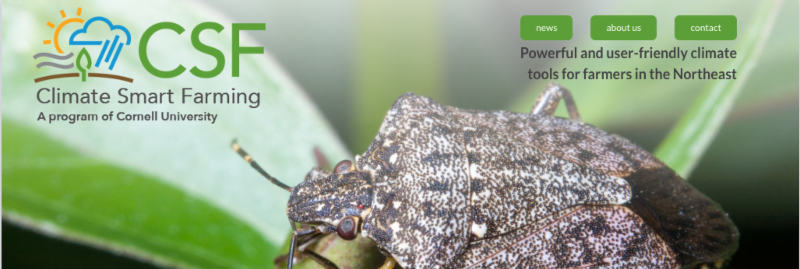
Cornell Climate Tools for the Northeastern US


 John Abatzoglou and Sanford Eigenbrode have both contributed to the CLN Webinar Series. They have taken the information they shared here and expanded it to AgClimate.net providing web resources for the topics they discussed for the Climate Learning Network. The posts include links to the downscale climate data tools discussed by John and in depth descriptions of the pests Sanford presented. Please make sure to check out the posts if you attended the webinars and are looking for more information on these topics!
John Abatzoglou and Sanford Eigenbrode have both contributed to the CLN Webinar Series. They have taken the information they shared here and expanded it to AgClimate.net providing web resources for the topics they discussed for the Climate Learning Network. The posts include links to the downscale climate data tools discussed by John and in depth descriptions of the pests Sanford presented. Please make sure to check out the posts if you attended the webinars and are looking for more information on these topics!
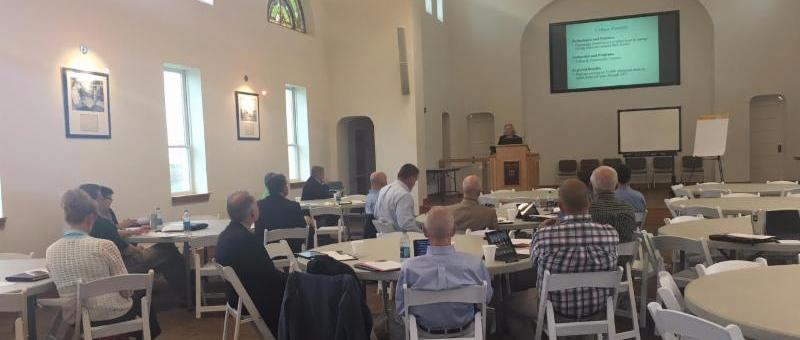
 Climate, Forests and Woodlands and Climate Science Initiative members met last month in Burlington, VT. The 2016 Joint Association of Natural Resource Extension Professionals (ANREP) and the National Association of Community Development Extension Professionals (NACDEP) was the forum for a pre-conference workshop that focused on two priority items: efficient information delivery systems, and effective message crafting for learners interested in climate extension programs.
Climate, Forests and Woodlands and Climate Science Initiative members met last month in Burlington, VT. The 2016 Joint Association of Natural Resource Extension Professionals (ANREP) and the National Association of Community Development Extension Professionals (NACDEP) was the forum for a pre-conference workshop that focused on two priority items: efficient information delivery systems, and effective message crafting for learners interested in climate extension programs. Using an innovative flipped classroom design, participants came ready to engage and collaborate after before-class work watching videos, reading reports and descriptions of the benefits of a flipped classroom. Applying this philosophy to create innovative programming around climate change was discussed in breakout groups, then discussions shared so everyone contributed and was exposed to the effective messaging lessons shared by the Tools for Engaging Landowners Effectively TELE group. Stay tuned to climate, forests and woodlands as they incorporate these lessons into their programming.
Using an innovative flipped classroom design, participants came ready to engage and collaborate after before-class work watching videos, reading reports and descriptions of the benefits of a flipped classroom. Applying this philosophy to create innovative programming around climate change was discussed in breakout groups, then discussions shared so everyone contributed and was exposed to the effective messaging lessons shared by the Tools for Engaging Landowners Effectively TELE group. Stay tuned to climate, forests and woodlands as they incorporate these lessons into their programming.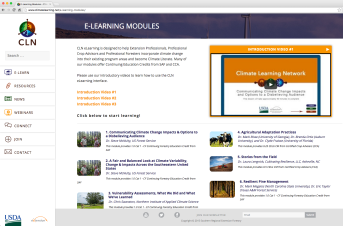 The Climate Learning Network is developing a new climate literacy certification program for Extension personnel and others that provide assistance to farmers, landowners and foresters. The certification will help professionals incorporate climate science into their daily programming and decision making. Climate issues will soon have an impact on production across the globe. Integrating climate concepts into daily decision making will help you and your clients prepare for an uncertain future. If you already incorporate climate issues into your Extension programming we need you to help us develop and test this new program! Please contact cln@sref.info to become a member of our Climate Advisors Network.
The Climate Learning Network is developing a new climate literacy certification program for Extension personnel and others that provide assistance to farmers, landowners and foresters. The certification will help professionals incorporate climate science into their daily programming and decision making. Climate issues will soon have an impact on production across the globe. Integrating climate concepts into daily decision making will help you and your clients prepare for an uncertain future. If you already incorporate climate issues into your Extension programming we need you to help us develop and test this new program! Please contact cln@sref.info to become a member of our Climate Advisors Network.
Following successful webinars from Dr. Marshall Shepherd and Dr. Sanford Eigenbrode, archives of which can be found at climatewebinars.net, we continue our latest webinar series with presentations from the USDA AFRI Coordinated Agricultural Project: Regional Approaches to Climate Change – Pacific Northwest Agriculture (REACCH) and Clemson’s Wood Utilization and Design Institute.

 On July 14th, 2016 at 1:00pm EDT, Dustin Albright, Assistant Professor at the Clemson University School of Architecture and member of Clemson’s Wood Utilization and Design Institute will present “Wood and Timber Design: Trends and Outlook”. Dustin will discuss the use of new wood construction materials and methods and their suitability for sustainable building. The presentation will address the life cycle benefits of wood and will touch on evolving building codes, which are increasingly friendly to these new techniques. A variety of case studies will be presented, with special attention being given to prefabricated building systems, including Cross-Laminated Timber and other similar “Massive Timber” products. Register for this webinar now.
On July 14th, 2016 at 1:00pm EDT, Dustin Albright, Assistant Professor at the Clemson University School of Architecture and member of Clemson’s Wood Utilization and Design Institute will present “Wood and Timber Design: Trends and Outlook”. Dustin will discuss the use of new wood construction materials and methods and their suitability for sustainable building. The presentation will address the life cycle benefits of wood and will touch on evolving building codes, which are increasingly friendly to these new techniques. A variety of case studies will be presented, with special attention being given to prefabricated building systems, including Cross-Laminated Timber and other similar “Massive Timber” products. Register for this webinar now.
Stay tuned to climatelearningnetwork.com for more information.
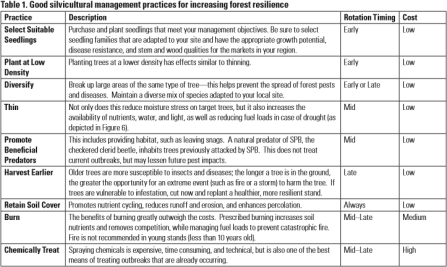 A new guidance factsheet will be published by North Carolina State University Cooperative Extension that summarizes great work done by the Pine Integrated Network: Education, Mitigation, and Adaptation project (PINEMAP). Healthy Forests:Managing for Resilience includes excellent recommendations on managing pine forests in a changing climate including this guide for silvicultural practices. The whole document will be available shortly. Stay tuned to the Climate Forests and Woodlands Community of Practice Facebook Page for availability.
A new guidance factsheet will be published by North Carolina State University Cooperative Extension that summarizes great work done by the Pine Integrated Network: Education, Mitigation, and Adaptation project (PINEMAP). Healthy Forests:Managing for Resilience includes excellent recommendations on managing pine forests in a changing climate including this guide for silvicultural practices. The whole document will be available shortly. Stay tuned to the Climate Forests and Woodlands Community of Practice Facebook Page for availability.
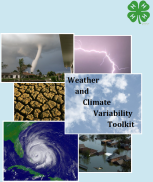
The Southeastern Climate Consortium and Florida 4-H have released a Weather and Climate Toolkit for 4-H.While this 133 page document was created for Florida, much of the information is applicable to the Southeast in general and it provides a great background on climate for the 4-H community.
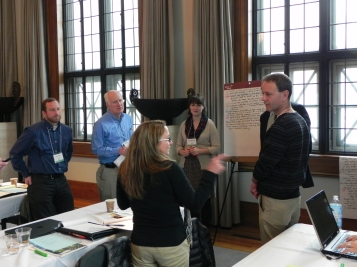 The USDA Northern Forests Climate Hub and Forest-Climate Working Group “Perspectives from the field” workshop, was held March 29 – 30, 2016 in Chicago. The workshop provided information on carbon science and policies, and associated USDA programs. Agency representatives identified resources, policies, and programs that can be used to further GHG mitigation in natural resource conservation and management in the forest sector. Speakers also showcased real-world examples of mitigation projects in the forest sector. The workshop focused on the USDA’s Building Blocks for Climate Smart Agriculture & Forestry. Attendees identified actions to utilize Forestry’s potential for reducing greenhouse gases and and developed an understanding of how forestry can contribute to the goals of the USDA building blocks.
The USDA Northern Forests Climate Hub and Forest-Climate Working Group “Perspectives from the field” workshop, was held March 29 – 30, 2016 in Chicago. The workshop provided information on carbon science and policies, and associated USDA programs. Agency representatives identified resources, policies, and programs that can be used to further GHG mitigation in natural resource conservation and management in the forest sector. Speakers also showcased real-world examples of mitigation projects in the forest sector. The workshop focused on the USDA’s Building Blocks for Climate Smart Agriculture & Forestry. Attendees identified actions to utilize Forestry’s potential for reducing greenhouse gases and and developed an understanding of how forestry can contribute to the goals of the USDA building blocks.The CLN has partnered with The Pacific Northwest Climate Change Hub, The University of Georgia Department of Geography, and the USDA AFRI Coordinated Agricultural Project: Regional Approaches to Climate Change – Pacific Northwest Agriculture (REACCH) to deliver a series of webinars this spring.

 The second webinar will in the series will feature Dr. J Marshall Shepherd from the Weather Channel’s Wx Geeks show. Dr. Shepherd will present: Climate Change Science 101 for Land Grant University Administrators: A Primer for Deans, Directors and Support Staff on May 19th, 2016 at 10:00 am EDT. Registration is open now.
The second webinar will in the series will feature Dr. J Marshall Shepherd from the Weather Channel’s Wx Geeks show. Dr. Shepherd will present: Climate Change Science 101 for Land Grant University Administrators: A Primer for Deans, Directors and Support Staff on May 19th, 2016 at 10:00 am EDT. Registration is open now.

Stay tuned to climatelearningnetwork.com for more information.
 CLN staff attended the Climate Change and Midwest Agriculture: Impacts, Challenges & Opportunities workshop held March 1st-2nd in Madison, WI. The Workshop provided an in-depth overview of climate change impacts in the Midwest and facilitated a working session using the beta version of the Adaptation Resources for Agriculture Workbook which is currently being adapted from the Northern Forestry Climate Hub’s Northern Forestry Adaptation Workbook.
CLN staff attended the Climate Change and Midwest Agriculture: Impacts, Challenges & Opportunities workshop held March 1st-2nd in Madison, WI. The Workshop provided an in-depth overview of climate change impacts in the Midwest and facilitated a working session using the beta version of the Adaptation Resources for Agriculture Workbook which is currently being adapted from the Northern Forestry Climate Hub’s Northern Forestry Adaptation Workbook.
The Workshop was attended by Midwest Climate Hub and Northern Forests Climate Hub staff and Leadership as well as Extension, ARS, NRCS and other USDA Agency Staff. Researchers from Universities throughout the Midwest were also in attendance. The working session using the new Workbook provided valuable feedback to the team adapting the document to fit agriculture. This feedback will be used to tailor the workbook for use in agriculture ultimately providing the Climate Hubs with a highly useful resource for Extension agents to use with producers in the region.